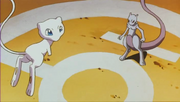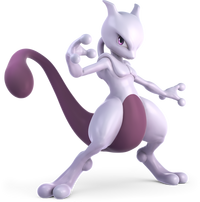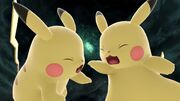|
Pokémon the First Movie: Mewtwo Strikes Back (simply as Pokémon: The First Movie or Mewtwo Strikes Back) is a 1998 Japanese animated fantasy adventure film directed by Kunihiko Yuyama. It is the first movie of the Pokémon series. It debuted in Japanese theaters on July 18, 1998, and then made its way to North American theaters on November 12, 1999. Mewtwo Strikes Back was shown with the Pikachu short Pikachu's Vacation.
The first anime special, Pokémon: Mewtwo Returns, is a sequel to this movie released in December 2000. During the end credits of Pokémon the Movie: The Power of Us, a CGI-animated remake, Pokémon: Mewtwo Strikes Back-Evolution, was released in July 2019 with Kunihiko Yuyama and Motonori Sakakibara directing the movie and on January 22, 2020, it was announced that Netflix would be releasing the English dubbed version of the film's remake.
Plot[]

Mewtwo and Mew
Ash Ketchum and his friends are tricked into visiting New Island, an island ruled by a mutant Pokémon, Mewtwo. There, they find out about Mewtwo's plans to clone their Pokémon and destroy the world, and a massive battle follows between the clones and the originals—including the "original" counterpart to Mewtwo: Mew.
Cast[]
| Character | Japanese voice actor | English voice actor |
|---|---|---|
| Ash Ketchum | Rica Matsumoto | Veronica Taylor |
| Misty | Mayumi Iizuka | Rachael Lillis |
| Brock | Yuji Ueda | Eric Stuart |
| Pikachu | Ikue Otani | |
| Togepi | Satomi Korogi | |
| Jessie | Megumi Hayashibara | Rachael Lillis |
| James | Shin-ichiro Miki | Eric Stuart |
| Meowth | Inuko Inuyama | Maddie Blaustein |
| Narrator | Unsho Ishizuka | Rodger Parsons |
| Mewtwo | Masachika Ichimura | Jay Goede |
| Mew | Kōichi Yamadera | |
| Fergus | Wataru Takagi | James Carter Cathcart |
| Corey | Toru Furuya | Ted Lewis |
| Neesha | Aiko Sato | Lisa Ortiz |
| Miranda | Sachiko Kobayashi | Lisa Ortiz |
| Raymond | Raymond Johnson | Maddie Blaustein |
| Giovanni | Hirotaka Suzuoki | Ted Lewis |
| Officer Jenny | Chinami Nishimura | Lee Quick |
| Nurse Joy | Ayako Shiraishi | Megan Hollingshead |
| Dr. Fuji | Yosuke Akimoto | Jay Goede |
| Meowthtwo | Chiyako Shibahara | |
Production[]
Kunihiko Yuyama directed the original Japanese version of the film, while Choji Yoshikawa and Takeshi Shudo served as producer and script writer respectively. The film wasn't produced by Pikachu Project. According to Shudo, certain episodes in the anime were intended to tie-in with the movie prior to its release in Japan and provide background behind the events in the film. However, the controversy surrounding the Electric Soldier Porygon episode delayed the tie-in episodes, causing Shudo to expand the beginning of the movie and, thus, the length of the film.
The English version editors translated various Japanese texts, including those on signs and on buildings, into English. The Shogakukan-Shueisha Productions also altered various background from the original version of the film in order to enhance its presentation overseas.
In the English dub, three Pokémon are referred to by the wrong name. Pidgeot was called Pidgeotto, Scyther was called Alakazam, and Sandslash was called Sandshrew. 4Kids Entertainment said that they decided to leave the Alakazam and Sandshrew errors when they noticed it as something for the children watching to notice and because they felt it was plausible in context that Team Rocket could make a mistake (though this would not explain why Corey refers to his Pidgeot by the wrong name).
Scenes in episodes[]
Three episodes of Pokémon Indigo League consists of The Battle of the Badge, It's Mr. Mime Time, and Showdown at the Po-ké Corral feature Mewtwo in scenes that prelude this movie. These episodes were supposed to air before the movie premiere, but due to the anime's four-month hiatus after the seizures caused by the banned episode Electric Soldier Porygon, the episodes ended up airing on September 17, 24, and October 8, 1998, respectively, whereas the movie premiered on July 18.
The scene in which Nidoking and Arcanine battle Mewtwo is adapted from Gary Oak's battle against Giovanni in The Battle of the Badge, but there are several differences between the two versions. The movie has a different perspective and animation, mostly evident in Mewtwo's appearance, which is more cartoony in the episode as opposed to the elaborate design of its armor in the movie. Mewtwo's whole body glows when it uses Psychic against Nidoking and Arcanine in the episode, but only its eyes glow in the movie. Mewtwo's chin is covered by its armor in the movie, but it is exposed in the episode. It is unknown whether this is an error or design change, since what looks like the chin could have been part of the armor if colored differently. Giovanni's position also differs: he stands up and walks forward before sending out Mewtwo in the episode, but stays seated in the movie.
In It's Mr. Mime Time, Mewtwo makes a cameo when the Team Rocket trio goes to Team Rocket HQ, apologizes to Giovanni, and has a brief video chat with him. The upward-panning shot of Mewtwo uses the same animation as when Mewtwo is first shown in its armor, though this scene chronologically takes place after the scene in the movie.
The scene of Mewtwo blasting out of Team Rocket HQ in Showdown at the Po-ké Corral is also shown in the movie's prologue. The explosion in the episode has a different perspective and animation, but both shots of Mewtwo flying away use the same animation. The shot of Giovanni's helicopter taking off in this episode uses the same animation (played in reverse) of the same helicopter landing on New Island in the movie.
Themes[]
Shudo explained in his blog that Mewtwo being torn over his life purpose reflects the film's theme of existentialism. In the Japanese script, for instance, the moment Mewtwo realizes he has a right to be in the world just as much as any other living creature represents the central message of accepting one's existence. Amber, who is named Ai (アイ) in the Japanese script, was named so to highlight the film's overall message of self-existence, with Ai being a homonym of the English word "I". These themes were largely toned down by 4Kids Entertainment, as Grossfeld felt American audiences needed to see a "clearly evil" villain rather than a morally ambiguous one. As such, the existential themes seen in the Japanese version were significantly toned down.
Marketing[]
Burger King released a limited series of kids' meal toys to tie in with the film. Also promoted were six 23 karat gold Pokémon cards, each enclosed inside a large plastic Poké Ball. Every card is a 23 karat gold plated slab of metal inside a clear protective plastic case that came with a certificate of authenticity signed by Nintendo of America chairman Howard Lincoln. The first run of gold cards sent and released to Burger King locations were packaged in a limited blue box that sold out immediately. A large second print of gold cards were packaged in a red box until the film promotion ended.
On December 11, 1999, 13-month-old Kira Murphy from California suffocated to death when half of the toy became stuck over her mouth and nose, causing her to suffocate, and was later found deceased in her playpen. Twelve days later, a second child in Kansas survived a similar incident. These incidents led to a website titled "Pokémon Kills". On December 28, 1999, Burger King issued a recall of the toys. Adults were urged to discard or return both pieces of the toy. Customers returning the toy were given a small order of french fries in return. Nearly a month after the recall, another child suffocated from the toy. The dead children's families settled their lawsuits on undisclosed terms.[1]
Manga[]
Toshihiro Ono, author of Electric Tale of Pikachu, created a manga version of the film. Asked by editors to draw Mewtwo's birth, he received the source material to base the manga off of in April 1998 and finished the manga in May. In July of that year, a five episode radio drama titled The Birth of Mewtwo was broadcast over the five Sundays leading up to the premiere of the movie in Japan. Written by Takeshi Shudo, the drama delves into Mewtwo's origin prior to the start of the film. It also explores the leadership of Team Rocket under Madame Boss, Giovanni's mother, and the last known whereabouts of Miyamoto (ミヤモト), Jessie's mother. Due to its mature themes, it was never dubbed in English. The drama eventually served the basis for the Origin of Mewtwo prologue that would appear in the extended version of the film. Since the drama was conceived a few months after the manga, the events depicted in the drama do not match up with the events portrayed in the manga. Ono has even stated that "there's not much connection between the manga and the movie".
Reception[]
In Japan, the film received positive reviews, with praise directed at the film's emotional impact and exploration of ethical topics such as cloning, genetic modification and existentialism[2]. However, the English-language version received generally negative reviews from film critics, with much of the criticism pointed at the poor voice acting and its inclusion of an anti-violence message despite it being a Pokémon film. Further retrospective criticism of the English-language version has been targeted against the removal of most of the ethical topics, such as part of Mewtwo's origin story.
Anime News Network review called the main feature "contradictory", stating that "the anti-violent message that is pretty much crammed down our throats works directly against the entire point of the franchise" and criticized Pikachu's Summer Vacation for being "incoherent, pointless and fluffy". Rating the movie two stars out of four, Roger Ebert of the Chicago Sun-Times called the movie "a sound-and-light show, linked to the marketing push for Pokemon in general" and said that the movie had "no level at which it enriches a young viewer, by encouraging thinking or observation." Michael Wood, of the Coventry Evening Telegraph, said that Pikachu's Summer Vacation "can only be described as a mind-numbingly tedious piece, with no discernible storyline and lots of trippy images and silly voices". Wood did note that the main feature had a "mildly intriguing premise", but said that the rest of the film "was like a martial arts movie without the thrills".
Retrospective reviews written several years after the release of the film have criticized the narrative changes made during the localization process, such as the omission of the extended-prologue detailing Mewtwo's origin and script changes that paint Mewtwo as an "oversimplified villain". Commenting on the English-language script of the film, Ryan Lambie of Den of Geek described the decision to cut Mewtwo's origin "a highly unfortunate move" and that the original Japanese script allowed for "a far more engrossing watch" due to its deeper exploration of mature, existential themes. Lambie also commented, however, that "the various edits made to its dialogue and story probably didn't mean much" to younger fans at the time of the movie's release, since the film was ultimately marketed towards children.
Box office[]
The film was a box office success worldwide, topping the box office charts in its opening weekend, and eventually grossing over $172 million at the worldwide box office. It also sold 10 million home video units in the United States, including 4.2 million VHS sales that earned $58.8 million in 2000.
In the U.S. box office, the film was an instant commercial success, debuting at number one and earning $10.1 million on its Wednesday opening day. This day is commonly referred to as the "Pokéflu" because so many children missed school to see the film, much to the chagrin of educators. This was the biggest animated film opening for any film in the history of Warner Bros. The film remained the only anime film to top the U.S. box office until 2021's Demon Slayer: Kimetsu no Yaiba – The Movie: Mugen Train.
In the United Kingdom, the film grossed £10.8 million at the box office. It is also the highest-grossing Japanese film in France and Germany, where it sold 2,224,432 and 3,222,452 box office admissions, respectively. In total, the film's worldwide box office gross was $172,744,662 (¥19 billion).
Accolades[]
| Award | Subject | Nominee | Result |
|---|---|---|---|
| Animation Kobe | Theatrical Film Award | OLM, Inc. | Won |
| Stinkers Award | Worst Achievement in Animation | OLM, Inc. | Won |
| Most Unwelcome Direct-to-Video Release | All nine Pokémon the Series videos released in 1999 | Won | |
| Biggest Disappointment (Films That Didn't Live Up to Their Hype) | Toho/Warner Bros. | Nominated | |
| Worst Screen Debut | First Pokémon Generation (all 151 of them!) | Nominated | |
| Worst Screenplay for a Film Grossing More than $100 Million Using Hollywood Math | Takeshi Shudo | Nominated | |
| Nickelodeon Kids' Choice Awards 2000 | Favorite Movie | Pokémon the First Movie: Mewtwo Strikes Back | Nominated |
Soundtrack[]
In Japan, the soundtrack is a two disc which includes The Birth of Mewtwo for the first and the second disc consists of the soundtrack to the original Japanese version of the film. Aim to Be a Pokémon Master '98 and Together With the Wind are the Japanese opening and ending songs, respectively. Sachiko Kobayashi, who performed the ending song, also voiced Miranda in the movie.
Pokémon: The First Movie – Music from and Inspired by the Motion Picture is the soundtrack to the first Pokémon film in the United States. It was released on November 10, 1999, on Compact Disc and Compact Cassette. Don't Say You Love Me by M2M was released as a single from the album, and it would later be featured on their debut studio album Shades of Purple. Pokémon Theme is the opening song, while We're a Miracle, (Hey You) Free Up Your Mind, If Only Tears Could Bring You Back and Don't Say You Love Me are the ending songs of the film.
Gallery[]
| Main article: Pokémon the First Movie: Mewtwo Strikes Back/gallery |
Legacy[]
Pokémon Live![]
Goede reprised Mewtwo in the stage musical Pokémon Live!. It appears to save Ash with a forcefield and attacks MechaMew2 with a collection of Ash's happy memories, love for Pokémon, and Misty. Mewtwo to take an unconscious Ash somewhere safe. Mewtwo exits with Ash and Pikachu, but not before explaining to Giovanni that Ash was the one who defeated MechaMew2.
Super Smash Bros. series[]

Mewtwo in Super Smash Bros. Ultimate
The characterization of Mewtwo in Super Smash Bros. Melee, Super Smash Bros. for Nintendo 3DS and Wii U and Super Smash Bros. Ultimate is based on the Mewtwo in this movie, in keeping with the anime inspiration for playable Pokémon characters. Masachika Ichimura reprised the character in Melee, and the Japanese version of the game contains quotes reminiscent of Mewtwo's character in the film. After Mewtwo returned as a Downloadable content fighter in Super Smash Bros. for Nintendo 3DS and Wii U, Mewtwo is voiced by Keiji Fujiwara in both SSB4 and Ultimate. The movie's title is also referenced in its reveal trailer. Several elements and references from the second Mewtwo in Pokémon the Movie: Genesect and the Legend Awakened were included in recent games such as its Mega Evolution, Final Smash, and Boxing Ring title.
Direct sequel[]
Mewtwo Returns is a direct sequel to the first movie, released in 2000 in Japan and the United States in 2001. In English, Mewtwo was voiced by Dan Green instead of Jay Goede. Green would later reprise Mewtwo in the CGI remake and the anime proper. The events of the special take place during the anime's fourth season, Pokémon Johto League Champions, between The Grass Route and The Apple Corp!
Remake[]
During the end credits of Pokémon the Movie: The Power of Us, it was announced that a CGI remake was set to release on the following year. In December 2018, the release date of the remake was revealed as July 12, 2019. Pokémon fansite Serebii.net reported that the film, titled Pokémon: Mewtwo Strikes Back — Evolution, would be directed by Kunihiko Yuyama and Motonori Sakakibara. Ichimura and Green reprised Mewtwo in the film. The English main cast were recast with their TPCi voice actors. On January 22, 2020, it was announced that Netflix would be releasing the English dubbed version of the film. The film was released worldwide outside of Japan and Korea on Pokémon Day on February 27, 2020 on Netflix.
Pokémon Journeys: The Series[]

Mewtwo in the anime proper
Mewtwo guest starred in the Pokémon Journeys: The Series episode Getting More Than You Battled For!, living on Cero Island, where it accepted a challenge from Ash and Goh, winning easily. Ichimura and Green reprised their roles in Japanese and English, respectively.
Mewtwo briefly appeared alongside its friends in These Could be the Starts of Something Big!, flying off in the background as Ash and Goh rode on Lugia.
Mewtwo Strikes Back is one of the few Pokémon movies that has been confirmed to not be a non-serial movie, and is in canon with the main anime, alongside Pokémon Heroes: Latios and Latias.
Trivia[]

Masahiro Sakurai posted an image to his Twitter account homaging the scene of Pikachutwo slapping Pikachu.
- On the 23rd anniversary of the movie's release, Kirby and Super Smash Bros. series creator Masahiro Sakurai posted an image to his Twitter account homaging the scene of Pikachutwo slapping Pikachu and mentioning the scene always made him cry.[3]
- In the English dub, Jessie makes a reference to Frankenstein.
- In Japan, this movie (paired with the Pikachu's Vacation short) was released on LaserDisc, being the only Pokémon media to be released on this medium.
- The movie's first trailer showed several prominent scenes that never appear in the movie. They were promotional scenes made before the movie script was finished. Most notable were scenes of Ash fleeing an explosion, a woman who looks like Misty accompanying Miranda and a younger character, and Team Rocket standing on a warship.[4]
- At ten minutes, this movie has the longest prologue. The prologue was further extended to 20 minutes in the Japanese extended version and twelve minutes in the international extended version.
- According to Takeshi Shudo, the prologue was only added after it was clear that the hiatus would make it impossible to have Mewtwo appear in the TV series before the movie's premiere.[5] Originally, Mewtwo would first appear onscreen when it revealed itself to the Trainers on New Island.
- According to Takeshi Shudo's notes on the movie, Ash Ketchum was petrified but not killed when Mewtwo and Mew's Psychic blasts collided with him, and the tears simply restored him.
See also[]
- Pikachu's Vacation (Pikachu short before the film)
- The Birth of Mewtwo
- Pokémon the Movie: Genesect and the Legend Awakened (another Pokémon movie featuring Mewtwo, in which Mewtwo was voiced by Reiko Takashima and Miriam Pultro)
- Mewtwo — Prologue to Awakening
- Detective Pikachu (another Pokémon movie featuring Mewtwo)
- Mewtwo Strikes Back—Evolution (CGI remake of the movie)
- Mewtwo Returns (sequel of the first movie)
- The Mastermind of Mirage Pokémon (anime special featuring Mewtwo and Mew)
References[]
- ↑ Reflecting on the Burger King Pokémon Disaster of 1999 Date: July 28, 2017. Author: Vice.
- ↑ How The Original Pokemon Movie Was Changed (And Made Worse) Outside Japan Date: May 8, 2019. Publisher: GameSpot.
- ↑ Masahiro Sakurai's Mewtwo Strikes Back tweet
- ↑ Mewtwo Strikes Back First Trailer Author: Dogasu.
- ↑ Takeshi Shudo interview
External links[]
- M01 at Bulbapedia, the Pokémon wiki.
- Pokémon the First Movie: Mewtwo Strikes Back at the Internet Movie Database
- Pokémon: The First Movie at Wikipedia, the free encyclopedia
- Pokémon the First Movie: Mewtwo Strikes Back at Anime News Network
